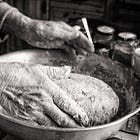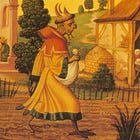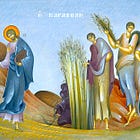The Church and the parable of the mustard seed
What does this parable tell us about the state of the Church in the world today—and does it promise a brighter future ahead?

In this chapter, Fr Coleridge tells us…
About the qualities of mustard!
Why Our Lord referred to a mustard seed in reference to his Church
What are the ‘birds of the air’ that come to rest in the tree
He also provides us with an image of the early Church in Jerusalem and Pagan Rome which offers strong parallels with the Church today:
Its numbers were very small, its members were altogether without influence, station, repute, and power.
An enemy of our Lord, such as Caiaphas or Annas, might have said to himself, within a few days of Pentecost, that the evil seed sown by the Nazarene Prophet had been indeed trampled under foot. […]
It was in their sight a thing insignificant in itself, and one of which there was no reason to fear the success. It did not appear to have any vitality, or any considerable inherent power of spreading itself and gaining a hold on the world. What was there in it to promise anything of the kind?
And so also there was nothing about the Church to attract the attention or raise the alarm of the politicians around the throne of the Cæsars at Rome. […]
The religion of the Christ was not worth meeting on its own ground, the ground of argument. It was quite sufficient to treat it as a detestable and unreasonable superstition, and drown it in the blood of its fanatical adherents, who were in their proper place as the prey of the wild beasts of the amphitheatre. […] It had no men of mind, no famous rhetoricians, no generals, no claimants to the purple.
But at last it came to fill the sky and its greatness could not be questioned, and then the powers of the world and the rulers of the nations began to discover in the Church an influence which might afford a shelter and a sustaining protection for themselves.
Will we see such a resurgence in our day?
Questions to consider:
Why do you think the Church sings this parable for this part of the liturgical year?
Why are all the readings from these surrounding Sundays drawn from the same part of Christ’s public life?
Why do the final Sundays converge around the parables, and these parables in particular?
Share your thoughts in the comments below.
This is a commentary on the first part of the Gospel read on the Sixth Sunday after Epiphany. Here is the second and third:
The Parable of the Mustard Seed
From
The Training of the Apostles Vol. III
Fr Henry James Coleridge, 1884, Ch. XII, pp 198-211
St. Matt. xiii. 31, 32; St. Mark iv. 30—32
Story of the Gospels, § 60
Sung at the Sixth Sunday after Epiphany and in one of the “spare” Sundays at the end of Pentecostide
The Two Parables
The two parables which follow in order on that of the seed growing of itself, are so placed by the two first Evangelists, who alone relate them, as to make it appear that they were delivered, if not at the same time, at least to the same audience, as those which have been already examined by us.
For the account of them is followed by the declaration of the Evangelists that our Lord spoke these things and other things to the people in parables as they were able to bear them, and that without parables He did not speak to them.
There are yet, as we shall see, three others, which belong to this time, but as to which we are not told that they were uttered to the people, and are rather led to think that they were addressed to the disciples only.
Our present business is with the first of the two, as to which it is undoubted that they were addressed to the multitudes.
Points in the Parable of the Mustard Seed
‘Another parable He proposed to them, and He said, to what shall we liken the Kingdom of Heaven? and to what parable shall we compare it?
‘It is like to a grain of mustard seed which a man took and sowed in his field, which when it is in the earth, is less than all the seeds that are in the earth, the least of all seeds, and when it is grown, it groweth up and becometh greater than all herbs, and becometh a tree, and shooteth out great branches, so that the birds of the air come and dwell in the branches under the shadow thereof.’
The points of the comparison are easily seized. The seed sown is very small, chiefly in comparison with the bulk which it attains, for there may be other seeds actually not larger than that which is spoken of.
It grows up to a size and height quite out of proportion, and becomes, although not a large tree among trees, still larger than others of the same class to which it belongs, so as to be a tree rather than a herb. It puts out branches, and in these branches and under its shade the birds of the air are content to dwell.
Thus this parable may be said, as has been the case with others, to spring out of the preceding parable. There our Lord had dwelt on the marvellous power of fructification possessed by the seed of corn, when it was once deposited in the ground, a power which it displayed without the labour of the sower, owing it only to its own innate vigour and to the elements in the earth and other circumstances which make it fruitful.
Now our Lord passes on to another comparison, and it is no longer the seed of corn that springs up as if the earth brought forth of itself, first the blade, then the ear, and then the full grain in the ear. Another image is required to set forth the magnitude which is attained by the growth of the spiritual seed, and this image is to be that of a seed which becomes at last nothing less than a tree, larger than the rest of its class, and capable of giving shelter to the fowls of the air.
In the former parable the point was that the seed should grow at all by virtue of its own powers, and in this the point is the size and magnitude which it attains and the shelter which it affords.
Question as to the plant itself
The first question raised as to this parable is that which relates to the image here used by our Lord.
It is not quite certain that the plant of which He speaks is that which we now call the mustard plant, and which in these countries we are not accustomed to see growing to any great size. It seems of little importance whether we can exactly identify the plant, and there is in the East a plant called Khardal, which is said to resemble mustard in everything, and to be considerably larger in growth.
But the most simple explanation seems to be that the plant is what we call mustard, but that in the East, and in other warmer countries than our own, it reaches a much larger size than among ourselves. Maldonatus says that in Spain its branches are used for heating ovens, and that flocks of birds collect in its boughs without breaking them down. There are other similar statements which seem to take away all difficulty as to the interpretation of the image.
Our Lord, as has been said, does not choose this particular plant to represent the Church or the Kingdom of Heaven because there are no trees of larger size, but because in this particular case the seed is very small, and the growth very large in comparison. There are plenty of instances in Sacred Scripture in which the image of a tree is applied to a Kingdom, as in the dream of Nabuchodonosor, and in the description of the Assyrian Empire in the Book of Ezechiel.1
But the trees there spoken of are larger and more magnificent, and it cannot be doubted that, with these images before Him, our Lord deliberately altered the particulars so as to make His tree a mustard tree.
Qualities of mustard
It is also asked whether we may consider that the use made of the mustard tree in particular by our Lord is meant to set us considering what are the peculiar qualities of this plant, in contrast to others, and outside the special point of the smallness of the seed in comparison to the growth.
Are we to endeavour to find in them some correspondence with the special characteristics of the Kingdom of Heaven to which it is compared? There are several passages in various Fathers in which this idea is followed out, and it can hardly be fanciful to think that the principle on which these commentaries are founded is legitimate, if not certainly true.
Thus the mustard seed is said, in a sermon attributed to St. Ambrose, to be small and of little value, to have no savour or odour which attracts and pleases, to require crushing or pounding before it gives out its taste, and then to show its pungent and biting qualities, to burn and sting like no other plant of the same order, as if a great power of fire had been enclosed in its small compass.
In these qualities some of the Christian writers have seen the humility and insignificance, whether of the Gospel teaching itself, or of the means of grace, the powers of the Word, though set forth by humble instruments, and the burning and stinging effects of grace on the soul which receives it into itself, having been accustomed to the softness and unwholesome sweetness of the world, the languor and torpor of sensuality, the smooth deceits of the effeminate life, and the like.
Main points of the parable
There can be no difficulty in following out this line of interpretation, and there is no reason for thinking that our Lord may not have had the qualities of the mustard seed before His mind, when He spoke this parable.
But the main point of the similitude seems to be that of the size and importance to which the mustard plant grows, having begun from so small a seed. Thus it would seem also that our Lord is directly pointing to the space which the Church would fill in the world, or, again, to the manner in which the influences of grace would fill the life of the soul and engross all its energies.
The Church itself was, when He left it at His Ascension, but an almost imperceptible germ in the midst of the great human society. Its numbers were very small, its members were altogether without influence, station, repute, and power.
An enemy of our Lord, such as Caiaphas or Annas, might have said to himself, within a few days of Pentecost, that the evil seed sown by the Nazarene Prophet had been indeed trampled under foot. Even the beginnings of the Church attracted little notice, at first, from those watchful foes who had brought about the death of our Lord, and it was thought by them sufficient, when their attention was at last aroused, to scourge the Apostles and forbid them to teach in the Name of the Lord.
It was in their sight a thing insignificant in itself, and one of which there was no reason to fear the success. It did not appear to have any vitality, or any considerable inherent power of spreading itself and gaining a hold on the world. What was there in it to promise anything of the kind?
Growth of the Church
And so also there was nothing about the Church to attract the attention or raise the alarm of the politicians around the throne of the Cæsars at Rome.
The Parthians or the Germans or the Dacians on the borders of the Empire gave them ten times the amount of anxiety. A revolt of the Gauls or a sedition in Alexandria was far more in their eyes than the preaching and miracles of the whole Apostolic band.
The religion of the Christ was not worth meeting on its own ground, the ground of argument. It was quite sufficient to treat it as a detestable and unreasonable superstition, and drown it in the blood of its fanatical adherents, who were in their proper place as the prey of the wild beasts of the amphitheatre.
Even while it was gradually filling the world and conquering silently all the better parts of the pagan society, it was still contemptible. It had no men of mind, no famous rhetoricians, no generals, no claimants to the purple.
But at last it came to fill the sky and its greatness could not be questioned, and then the powers of the world and the rulers of the nations began to discover in the Church an influence which might afford a shelter and a sustaining protection for themselves.
They began to see how the Church made men the best citizens in this life as well as the heirs of the life to come, how law had no foundation so secure as conscience, how the public service was never so safe as in the hands of those who sought a heavenly kingdom, how all that is good and noble and fruitful, in the natural order, was fostered and developed and magnified and endowed with a new life, by the breath of the Divine Spirit of the Kingdom of the Incarnation, how philosophy became fixed and rooted in immutable and unquestionable truth, how science received fresh wings to soar to Heaven, and fresh keenness of perception to unlock the treasures and the secrets of nature, how art became heavenly, instead of the reflection of the lower passions, how the world, the inheritance of man, was laid open to him at last to enter and take possession of it, and how the civilization and elevation of the whole race into one great and enlightened brotherhood became no longer an impossible dream.
The ‘fowls of the air’
All these truths are included under those simple words of our Lord, that ‘the fowls of the air came to dwell in the branches thereof.’ It may well be that the powers of the Church for the enlightenment and elevation of mankind in the natural order have never as yet been fully developed, and that the future history of the world may proceed on the same lines as that of the last centuries, in which the Church has been losing rather than gaining on the allegiance of the nations, which is the necessary condition of the accomplishment of this work.
But our Lord speaks of results that have been fulfilled, though they might have been more gloriously fulfilled than they have been. He does not use the whole glowing language of the evangelical prophet, for in the prophecies of the latter there are more lofty things said concerning the dominion of the Church than are contained in the comparatively modest image of the mustard tree.
Indeed, this contrast is remarkable between the language of the prophetical passages which our Lord must have had in His mind, as He uses in some particulars the very words of those prophets, and His own humble prediction, for prediction it is, concerning His Kingdom. He seems to tell us that the Church is to be conspicuous for its wonderful growth and also for its protective power.
But He does not say that that growth shall fill the whole world, nor that the whole natural order of society shall take refuge under its shade. Ezechiel had said, in describing the ultimate glories of the Church,
‘I myself will take of the marrow of the high cedar and will set it; I will crop off a tender twig from the top of the branches thereof, and I will plant it on a mountain high and eminent.
‘On the high mountains of Israel will I plant it, and it shall shoot forth into branches and shall bear fruit and it shall become a great cedar, and all birds shall dwell under it, and every fowl shall make its nest under the shadow of the branches thereof.’2
There is His own humility in the way in which our Lord has adapted this image to the circumstances of the history of the Church. But, on the other hand, looking back to that history as it has unfolded itself, before angels and men, during nineteen centuries, we cannot fail to be struck with the exactness of the fulfilment of the prediction of our Lord, modified as it is from the more glowing language of His Prophet.
Growth of grace and love of God in a soul
What is true of the history of the Church in the accomplishment of its work is also by a kind of necessity true of the working of Divine grace in the single individual soul. It may not only most truly be said, that the unhindered working of grace in any single heart produces immense results, out of all proportion to its beginnings. This may be seen in considering the work of sanctification in a soul such as that of St. Paul or St. Mary Magdalene.
It is also true that there is in such cases something which may be considered as answering to the result of which our Lord speaks, when He says that the fowls of the air take refuge in the branches of the mustard tree. In itself, the progress of a soul to perfection, as far as that progress can be traced as ordinarily following any general law, is a work and a growth of very great magnitude in the moral and spiritual order.
The seed that is first sown is the love of God, or the desire of His grace and friendship in some way or degree, whether it takes the form of a flight from the miseries of the world and of a life of sin, or of that desire of higher things which our Lord wished to arouse in the heart of the rich young man, when He bade him, after keeping the commandments from his youth up, to go and sell what he had and give to the poor and come, follow Him.
It is a great thing, that earnest and vigorous turning away from past sins in confession and contrition, with which the process of the purgation of the soul is commenced. It is a great thing, that holy self-hatred in which those who are to be led on to perfection fly from the occasions of sin, as St. Peter did when he went out and wept bitterly, and which vents itself in the affliction of the body, as the instrument of sin, in the penances of the saints of which we read so much as the first step in their conversion.
This work of satisfaction is a great triumph over nature, the severe poverty, the abandonment of earthly goods, the seeking for contempt, the vengeance on themselves to which they are so often guided. This self-affliction lasts often more or less in various degrees during their whole life, though bodily infirmities, or other causes of prudence, may interfere in regulating its measure.
Gradual progress
The saints have not only to get rid of their sins and of the penalties of their sins in confession. They have to root out the bad habits which have fastened themselves on the soul as weeds upon the soil of some neglected garden.
The long list of the seven deadly sins and their children, as they are called by spiritual writers, remains for perfect extirpation and conquest, evil roots ever ready to spring up, the moment the watchfulness of self-discipline is relaxed.
Then comes the equally long and arduous process of the subjugation of the affections and passions, the concupiscent and irascible principles in the soul, which are not to be exterminated like the seeds of vice, but to be reduced to proper order and rule, so as to be useful under the guidance of mortification, until the firm peace of the interior kingdom is established.
This peace requires the long, but the blessed and happy labour, of the planting in of the Christian virtues after the example of our Lord, humility, the contempt of the world, human honour and glory, the willing subjection of themselves to others, obedience, ready to undertake any toils and exertions which may be enjoined upon it, the abnegation of self-will and judgment, the love of suffering, patience, readiness under contumely, joy in adversity and humiliation after the pattern of Christ in His Passion, the perfect practice of purity, the banishing of sensual images and thoughts from the soul, which is gradually taken possession of even as to its imaginations and fancies by the spirit of holy devotion, and the representations which belong to it.
This region of the virtues is a glorious world, into which the love of God and of perfection leads the soul. And it soon becomes aware that there is nothing which can put it in possession of this new Kingdom but the life of prayer, as the same life is also the surest weapon for the conquest of the passions and the acquisition of interior peace.
A soul thus occupied by the spirit of prayer is raised, in one sense, to a heavenly life. But in another the world is laid open to it as a matter of study and anxiety, because it becomes sensible of the vast range covered by the interests of God and the work of our Lord in the world around it.
Contemplation opens to such a soul the miseries of the world, the whole series of the Life and actions of our Lord, the beauties of the souls of His Blessed Mother and of the Saints, the benefits by which God has enriched His creatures, the Divine perfections, and the mysteries hidden in the Sacred Scriptures. Such a soul is moved to weep over the blindness of men, the miseries and calamities of which sin is the parent, its own daily defects and past offences.
It is kindled with fresh desire for virtue, it learns the power of the intercession of our Blessed Lady and of the Saints of God, it rejoices in the union with God which it is already allowed to attain, it pours itself out in prayer for the conversion of sinners and unbelievers, and the exaltation of the Name of God.
It finds a holy joy in the perfection with which that Name is already honoured by the good, it melts in praise of His majesty and glory, it closes more and more entirely with His will in all things regarding itself and others, and becomes more and more altogether one with Him.
State of perfection
A soul that has learnt to live in prayer, after passing through the stages already enumerated, is indeed a plant, in the garden of the Lord, of marvellous growth and magnificence. It may require the eye of Heaven to discern all its beauties, and so far it may not perfectly answer to the image which is here used by our Lord, which seems to be in the main an image of external growth.
But the development of the holy seed in it completely corresponds to the words of the parable.
The mind is pure, if not from all slight defects, at least from wilful and serious irregularities.
The casting away of temporal things is complete, for the heart is filled with the untold treasures of the spiritual world, and to such a heart there is no room for the love of the things of this world.
The appetites are reduced to peace under the rule of charity.
The tongue has been tamed to perfect circumspection.
The thoughts are well-ordered, all pure and clean, not simply from the foul images and desires of the lowest appetites, but even from all that is idle and vain, frivolous and inordinate, unworthy of the eye of God.
The desires are indeed impatient with a holy impatience, longing for the works and the services of the children of God with an eagerness which surpasses in intensity and force the ambition of the worldling, the craving for greed of the avaricious, the sensual yearnings of the voluptuary, and the baneful desires of revenge which torment the hearts in which hatreds and animosities reign.
In such souls as these all the works are beautiful, not only in aim and intention, in substance and in character, but in completeness and integrity, in the absence of all flaw and inattention and wavering or uncertainty of purpose, of all self-complacency or vanity to mar them after they are accomplished. In such souls, moreover, there is not only the robust activity which issues in the whole range of virtues, as opportunity for exertion is afforded.
There is also the patient endurance of adversity and hardship, the joy in tribulation and trial, the constancy in the midst of the fires of temptation, which mark the consummate perfection of the imitators of our Lord. In them indeed the grain of mustard seed, to revert to the original image used in this parable, reveals its qualities when crushed and beaten down.
Such men ‘possess their souls in patience,’ as our Lord elsewhere says, and their gentleness and sweetness are most fully manifested under the sharp trials of persecution, and the perpetual friction of the imperfections of those among whom they live.
Interior fruitfulness and beauty
It is needless to speak of the other internal perfections which grow out of the full work of grace in these perfect souls, the manner in which their charity binds all their faculties to a continual occupation on their one best object, that is on God, how their will is so united to His as to be moved by it as the limbs of the body are moved by the soul, how they are, in the sense in which the Apostle speaks, transformed into God, nailed together with Christ to the Cross, so that not they live, but Christ liveth in them.
But these thoughts are enough to show how large and powerful and fruitful is the growth of grace in the faithful soul, which opposes no hindrance to the work of God within it. It indeed becomes a great tree, and fills the wide heaven of the soul in which God has chosen to dwell.
And, if we are to seek, in this application also of the parable, for something which may answer to the latter part of our Lord’s description, when He says that the birds of the air come and make their nests in the branches of this blessed tree, we may find this in a twofold consideration.
Development of the mind
In the first place, the process of sanctification and of growth in perfection of which we have been speaking, affects indeed directly the spiritual faculties and the moral life of the soul, but it has also its most precious though indirect effects on the intellectual and mental faculties also.
It perfects the will, it develops the mind, it regulates and trains the imagination to flights and achievements for which it would otherwise have no capacity. The whole man is ennobled and elevated, he is more truly a man, made after the image of God.
Just as vice degrades and enfeebles and endarkens and lowers and makes childish, even the men who are most wonderfully gifted with intellectual endowments, so does union with God and the constant presence of His grace, acting on the soul, raise men above the tottering and stammering and dreamy and purposeless imbecility in which the life of worldliness and pleasure consists.
That life has its cruel and malignant side, for it is essentially the worship of self. But, measured by an intellectual standard only, it is the life of the lower animals led by beings who are the heirs of His Heavenly Kingdom, and yet who never rise to the level of their gifts and destinies, any more than the children who die in the cradle, or the idiots who grin and chatter throughout a life, long in years, which yet can never be truly called a life.
Profit to others
And again, in another sense, there is a grand result of the growth of perfection in a single soul which benefits others, and which therefore may be considered as a fulfilment of this part of our Lord’s parable. For no one is good and virtuous and holy and perfect in his union with God and in the ripe maturity of His spiritual gifts, who is not of immense service to all around him.
The interior peace and light and strength of these pure souls fall on those who come across them, in patience, and meekness, and charity, in wise and holy counsels, in bright examples, breathing courage and hope on all who see them, and in the power of a lifelong prayer.
The saints are the true supports of the world, the guides of the ignorant, the beacons of the wanderer, the comfort of the lonely and broken-hearted. Their wisdom leads the Church in her pilgrimage, their prayers are the strength and the light of the champions of the faith.
From Fr Henry James Coleridge, The Training of the Apostles Vol. III
In the commentary on the next part of this Sunday’s Gospel…
What the parable of the leaven tells us about the action of the Church in the world
How the parable sets out the necessary conditions for sharing the Catholic faith with others.
The three main pitfalls for Christians represented by what Christ calls the leaven of the Pharisees, of Herod and of the Saducees.
Here’s why you should subscribe to The Father Coleridge Reader:
Coleridge provides solid explanations of the entirety of the Gospel
His work is full of doctrine and piety, and is highly credible
He gives a clear trajectory of the life of Christ and all its stages.
If more Catholics knew about works like Fr Coleridge’s, then other works based on sentimentality or dubious private revelations would be less attractive.
Sourcing and curating the texts, cleaning up scans, and editing them for online reading is a labour of love, and takes a lot of time.
Will you lend us a hand and hit subscribe?
Read next:
Follow our projects on Twitter, YouTube and Telegram:
Ezechiel xxxi. 3-9.
Ezechiel xvii, 22, 23.








